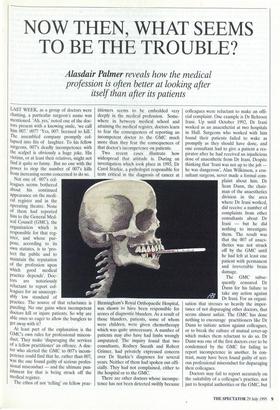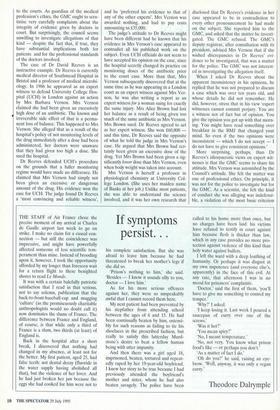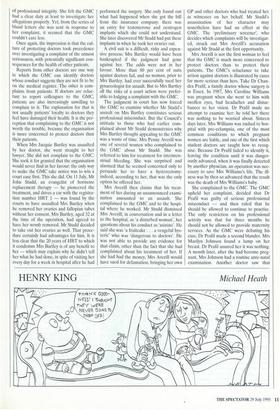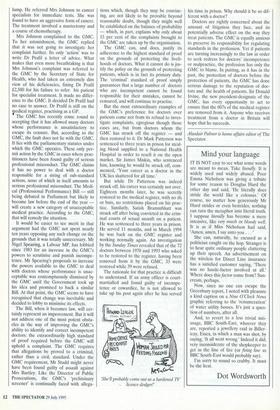NOW THEN, WHAT SEEMS TO BE THE TROUBLE?
Alasdair Palmer reveals how the medical
profession is often better at looking after itself than after its patients
LAST WEEK, as a group of doctors were chatting, a particular surgeon's name was mentioned. `Ah, yes,' noted one of the doc- tors present with a knowing smile, 'we call him 007.' 007? 'Yes, 007: licensed to kill.' The assembled company promptly col- lapsed into fits of laughter. To his fellow surgeons, 007's deadly incompetence with the scalpel is obviously a huge joke. His victims, or at least their relatives, might not find it quite so funny. But no one with the power to stop the number of 007's kills from increasing seems concerned to do so.
At least part of the explanation is the GMC's own rules for professional miscon- duct. They make 'disparaging the services of a fellow practitioner' an offence. A doc- tor who alerted the GMC to 007's incom- petence could find that he, rather than 007, was the one found guilty of serious profes- sional misconduct — and the ultimate pun- ishment for that is being struck off the medical register. The ethos of not 'telling' on fellow prac- titioners seems to be embedded very deeply in the medical profession. Some- where in between medical school and attaining the medical register, doctors learn to fear the consequences of reporting an incompetent doctor to the GMC much more than they fear the consequences of that doctor's incompetence on patients.
Two recent cases illustrate how widespread that attitude is. During an investigation which took place in 1993, Dr Carol Starkie, a pathologist responsible for tests critical in the diagnosis of cancer at Birmingham's Royal Orthopaedic Hospital, was shown to have been responsible for scores of diagnostic blunders. As a result of those blunders, patients, some of whom were children, were given chemotherapy which was quite unnecessary. A number of patients may also have had limbs wrongly amputated. The inquiry found that two consultants, Rodney Sneath and Robert Grimer, had privately expressed concern over Dr Starkie's diagnoses for several years. Neither of them had spoken out offi- cially. They had not complained, either to the hospital or to the GMC.
There are other doctors whose incompe- tence has not been detected swiftly because The GMC subse- quently censured Dr Dunn for his failure to take any action against Dr Irani. For an organi- sation that stresses so heavily the impor- tance of not disparaging other doctors, that seems almost unfair. The GMC has done nothing to encourage practitioners like Dr Dunn to initiate action against colleagues, or to break the culture of mutual cover-up which makes them reluctant to do so. Dr Dunn was one of the first doctors ever to be condemned by the GMC for failing to report incompetence in another. In con- trast, many have been found guilty of seri- ous professional misconduct for disparaging their colleagues.
Doctors may fail to report accurately on the suitability of a colleague's practice, not just to hospital authorities or the GMC, but to the courts. As guardian of the medical profession's ethics, the GMC ought to scru- tinise very carefully complaints about the integrity of evidence given by doctors in court. But surprisingly, the council seems unwilling to investigate allegations of that kind — despite the fact that, if true, they have substantial implications both for patients and for the professional standards of the doctors involved.
The case of Dr David Reeves is an instructive example. Dr Reeves is currently medical director of Southmead Hospital in Bristol and a professor of medical microbi- ology. In 1986 he appeared as an expert witness to defend University College Hos- pital (UCH) in London against an action by Mrs Barbara Vernon. Mrs Vernon claimed she had been given an excessively high dose of an antibiotic. The known and irreversible side effect of that is a perma- nent loss of balance. This happened to Mrs Vernon. She alleged that as a result of the hospital's policy of not monitoring levels of the drug immediately after a dose had been administered, her doctors were unaware that they had given too high a dose. She sued the hospital.
Dr Reeves defended UCH's procedure on the grounds that a fuller monitoring regime would have made no difference. He claimed that Mrs Vernon had simply not been given an excessive or dangerous amount of the drug. His evidence won the case for UCH. The judge found Dr Reeves a 'most convincing and reliable witness', and he 'preferred his evidence to that of any of the other experts'. Mrs Vernon was awarded nothing, and had to pay costs amounting to £35,000.
The judge's attitude to Dr Reeves might have been different had he known that his evidence in Mrs Vernon's case appeared to contradict all his published work on the subject. Even UCH officials do not seem to have accepted his opinion on the case, since the hospital secretly changed its practice on monitoring doses of the antibiotic prior to the court case. More than that, Mrs Vernon subsequently discovered that at the same time as he was appearing in a London court as an expert witness against Mrs Ver- non, he was also writing a report as an expert witness for a woman suing for exactly the same injury. Mrs Alice Brown had lost her balance as a result of being given too much of the same antibiotic as Mrs Vernon. Mrs Brown sued. Dr Reeves agreed to act as her expert witness. She won £60,000 and this time, Dr Reeves said the opposite of what he told the judge in Mrs Vernon's case. He argued that Mrs Brown had cer- tainly been given an excessive dose of the drug. Yet Mrs Brown had been given a sig- nificantly lower dose than Mrs Vernon, even when body weight was taken into account.
Mrs Vernon is herself a professor in physiological chemistry at University Col- lege London. (She uses her maiden name of Banks at her job.) Unlike most patients, she was able to understand the science involved, and it was her own research that disclosed that Dr Reeves's evidence in her case appeared to be in contradiction to every other pronouncement he had made on the subject. She reported him to the GMC, and asked that the matter be investi- gated. The GMC refused. The GMC's deputy registrar, after consultation with its president, advised Mrs Vernon that if she wished discrepancies in Dr Reeves' evi- dence to be investigated, that was a matter for the police. The GMC was not interest- ed in investigating the allegation itself.
When I asked Dr Reeves about the apparent inconsistency in his opinions, he replied that he was not prepared to discuss a case which was over ten years old, and whose details he did not remember. He did, however, stress that in his view 'expert witnesses cannot commit perjury. You are a witness not of fact but of opinion. You give the opinion you got up with that morn- ing. You might have read something over breakfast in the BMJ that changed your mind. So even if the two opinions were inconsistent — which I do not accept — I do not have to give consistent opinions.'
More surprising, perhaps, than Dr Reeves's idiosyncratic views on expert wit- nesses is that the GMC seems to share his attitude. Mrs Vernon was astonished by the Council's attitude. She felt the matter was one of professional ethics. On principle, it was not for the police to investigate but for the GMC. As a scientist, she felt the kind of conduct she was alleging was indefensi- ble, a violation of the most basic criterion of professional integrity. She felt the GMC had a clear duty at least to investigate her allegations properly. Yet, from the series of bland letters she was sent in response to her complaint, it seemed that the GMC couldn't care less.
Once again, the impression is that the cul- ture of protecting doctors took precedence over investigating a complaint of the utmost seriousness, with potentially significant con- sequences for the health of other patients.
Reports from other doctors are one way in which the GMC can identify doctors whose conduct suggests they are not fit to be on the medical register. The other is com- plaints from patients. If doctors are reluc- tant to report colleagues to the GMC, patients are also increasingly unwilling to complain to it. The explanation for that is not usually patients' loyalty to doctors they feel have damaged their health. It is the per- ception that complaining to the GMC is not worth the trouble, because the organisation is more concerned to protect doctors than their patients.
When Mrs Jacquie Bartley was assaulted by her doctor, she went straight to her lawyer. She did not complain to the GMC. She took it for granted that the organisation would never find in her favour: the only way to make the GMC take notice was to win a court case first. This she did. On 11 July, Mr John Studd, an evangelist of hormone replacement therapy — he pioneered the treatment, and drives a car with the registra- tion number HRT 1 — was found by the courts to have assaulted Mrs Bartley when he removed her ovaries and fallopian tubes without her consent. Mrs Bartley, aged 32 at the time of the operation, had agreed to have her womb removed. Mr Studd decided to take out her ovaries as well. That proce- dure certainly had advantages for him. It is less clear that the 20 years of HRT to which it condemns Mrs Bartley is of any benefit to her — which may explain why he didn't tell her what he had done, in spite of visiting her every day for a week in hospital after he had performed the surgery. She ,only found out what had happened when she got the bill from the insurance company: there was an entry for testosterone and oestrogen implants which she could not understand. She later discovered Mr Studd had put these implants in when he took her ovaries out.
A civil suit is a difficult, risky and expen- sive process: Mrs Bartley would have been bankrupted if the judgment had gone against her. The odds were not in her favour. More than 80 per cent of suits against doctors fail, and no woman, prior to Mrs Bartley, had ever successfully sued her gynaecologist for assault. But to Mrs Bartley all the risks of a court action were prefer- able to lodging a complaint with the GMC.
The judgment in court has now forced the GMC to examine whether Mr Studd's assault on Mrs Bartley constitutes serious professional misconduct. But the Council's attitude to those who had earlier com- plained about Mr Studd demonstrates why Mrs Bartley thought appealing to the GMC was a waste of time. Mrs Penny Averill was one of several women who complained to the GMC about Mr Studd. She was referred to him for treatment for intermen- strual bleeding. She was surprised and alarmed that he seemed concerned only to persuade her to have a hysterectomy: indeed, according to her, that was the only option he offered her.
Mrs Averill then claims that his treat- ment of her during an unannounced exami- nation amounted to an assault. She complained to the GMC and to the hospi- tal where he worked. Mr Studd dismissed Mrs Averill, in conversation and in a letter to the hospital, as 'a disturbed woman', her questions about his conduct as 'asinine'. He said she was 'a fruitcake . . . a vengeful hys- teric' who was 'dangerous to doctors'. He was not able to provide any evidence for that claim, other than the fact that she had complained about his treatment of her. If she had had the money, Mrs Averill would have sued for defamation, bringing her own GP and other doctors who had treated her as witnesses on her behalf. Mr Studd's assassination of her character may nonetheless have had an effect at the GMC. The 'preliminary screener', who decides which complaints will be investigat- ed, struck out Mrs Averill's accusation against Mr Studd at the first opportunity.
Mrs Averill is not the first woman to feel that the GMC is much more concerned to protect doctors than to protect their patients. The GMC's reluctance to take action against doctors is illustrated by cases far more serious than hers. Take Dr Chan- dra Prafil, a family doctor whose surgery is in Essex. In 1987, Mrs Caroline Williams was pregnant when she went to him with swollen eyes, bad headaches and distur- bances to her vision. Dr Prafil made no attempt to examine her: he told her there was nothing to be worried about. Sixteen days later, Mrs Williams was rushed to hos- pital with pre-eclampsia, one of the most common conditions to which pregnant women are liable, and one of the first which student doctors are taught how to recog- nise. Because Dr Prafil failed to identify it, leaving the condition until it was danger- ously advanced, when it was finally detected by another physician, an operation was nec- essary to save Mrs Williams's life. The ill- ness was by then so advanced that the result was the death of Mrs Williams's baby.
She complained to the GMC. The GMC upheld her complaint, decided that Dr Prafil was guilty of serious professional misconduct — and then ruled that he should be allowed to continue to practise. The only restriction on his professional activity was that for three months he should not be allowed to provide maternity services. As the GMC were debating his case, Dr Prafil made a second blunder. Mrs Marilyn Johnson found a lump on her breast. Dr Prafil assured her it was nothing. A month later, after she had become preg- nant, Mrs Johnson had a routine ante-natal examination. Another doctor saw that lump. He referred Mrs Johnson to cancer specialists for immediate tests. She was found to have an aggressive form of cancer. The treatment involved a mastectomy and a course of chemotherapy.
Mrs Johnson complained to the GMC. To her astonishment, the GMC replied that it was not going to investigate her complaint further. Its only 'action' was to write Dr Prafil a letter of advice. What makes that even more breathtaking is that Mrs Johnson's complaint was referred to the GMC by the Secretary of State for Health, who had taken an extremely dim view of his deficiencies, fining Dr Prafil £2,500 for his failure to refer his patient for specialist treatment. It made no differ- ence to the GMC. It decided Dr Prafil had no case to answer. Dr Prafil is still on the iedical register, practising as a GP. The GMC has recently come round to accepting that it has allowed many doctors whose performance is unsatisfactory to escape its censure. But, according to the GMC, the fault does not lie with the GMC. It lies with the parliamentary statutes under which the GMC operates. These only per- mit action by the GMC in cases where prac- titioners have been found guilty of serious professional misconduct. The GMC claims it has no power to deal with a doctor responsible for a string of sub-standard actions, none of which in itself amounts to serious professional misconduct. The Medi- cal (Professional Performance) Bill — still being debated in Parliament but likely to become law before the end of the year will create a new category of unacceptable medical practice. According to the GMC, that will remedy the situation.
It would be easier to see merit in that argument had the GMC not spent nearly ten years opposing any such change on the grounds that it was totally unnecessary. Mr Nigel Spearing, a Labour MP, has lobbied since 1983 for an increase in the GMC's powers to scrutinise and punish incompe- tence. Mr Spearing's proposals to increase the powers available to the GMC to deal with doctors whose performance is unac- ceptable was contemptuously dismissed by the GMC until the Government took up his idea and promised to back a similar Bill. At that point, the GMC seems to have recognised that change was inevitable and decided to lobby to minimise its effects.
The Bill, when it becomes law, will cer- tainly represent an improvement. But it will not address one of the most potent obsta- cles in the way of improving the GMC's ability to identify and correct incompetent doctors: the extraordinarily high standard of proof required before the GMC will uphold a complaint. The GMC requires that allegations be proved to a criminal, rather than a civil, standard. Under the GMC requirement, Mr Studd might never have been found guilty of assault against Mrs Bartley. Like the Director of Public Prosecutions, the GMC's 'preliminary screener' is continually faced with allega- tions which, though they may be convinc- ing, are not likely to be provable beyond reasonable doubt, though they might well be established on the balance of probability — which, in part, explains why only about 15 per cent of the complaints brought to the GMC are taken up by the organisation.
The GMC can, and does, justify its adherence to the highest standard of proof on the grounds of protecting the liveli- hoods of doctors. What it cannot do is jus- tify the policy on the grounds of protecting patients, which is in fact its primary duty. The 'criminal' standard of proof simply guarantees that a large number of doctors who are incompetent cannot be found responsible for their mistakes, cannot be censured, and will continue to practise.
But the most extraordinary examples of the GMC's preference for doctors over patients come not from its refusal to inves- tigate complaints, egregious though those cases are, but from doctors whom the GMC has struck off the register — and then restored to it. Dr Mark Patterson was sentenced to three years in prison for steal- ing blood supplied to a National Health Hospital in order to resell it on the open market. Sir James Miskin, who sentenced him, knowing he would be struck off, com- mented, 'Your career as a doctor in the UK lies shattered for all time.'
But while Dr Patterson was indeed struck off, his career was certainly not over. Eighteen months later, he was secretly restored to the medical register, with no ifs or buts, no restrictions placed on his prac- tice. Similarly, Satish Brammbhatt was struck off after being convicted in the crim- inal courts of sexual assault on a patient. He was sentenced to three years in prison. He served 11 months, and in March 1994 he was back on the GMC register and working normally again. An investigation by the Sunday Times revealed that of the 72 doctors between 1970 and 1993 who asked to be restored to the register, having been removed from it by the GMC, 33 were restored while 39 were refused.
The rationale for that practice is difficult to understand. If an army officer is court- martialled and found guilty of incompe- tence or cowardice, he is not allowed to take up his post again after he has served `She'll probably come out as a hardened TV licence dodger!' his time in prison. Why should it be so dif- ferent with a doctor?
Doctors are rightly concerned about the amount of litigation they face, and its potentially adverse effect on the way they treat patients. The GMC is equally anxious to preserve its responsibility for regulating standards in the profession. Yet if patients are turning increasingly to the law in order to seek redress for doctors' incompetence or malpractice, the profession has only the GMC to blame. In putting, as it has in the past, the protection of doctors before the protection of patients, the GMC has done serious damage to the reputation of doc- tors and the health of patients. Sir Donald Irvine, the new president-designate of the GMC, has every opportunity to act to ensure that the 007s of the medical register are removed from it. Anyone who receives treatment from a doctor in Britain will hope that he succeeds.
Alasdair Palmer is home affairs editor of The Spectator.





















































 Previous page
Previous page